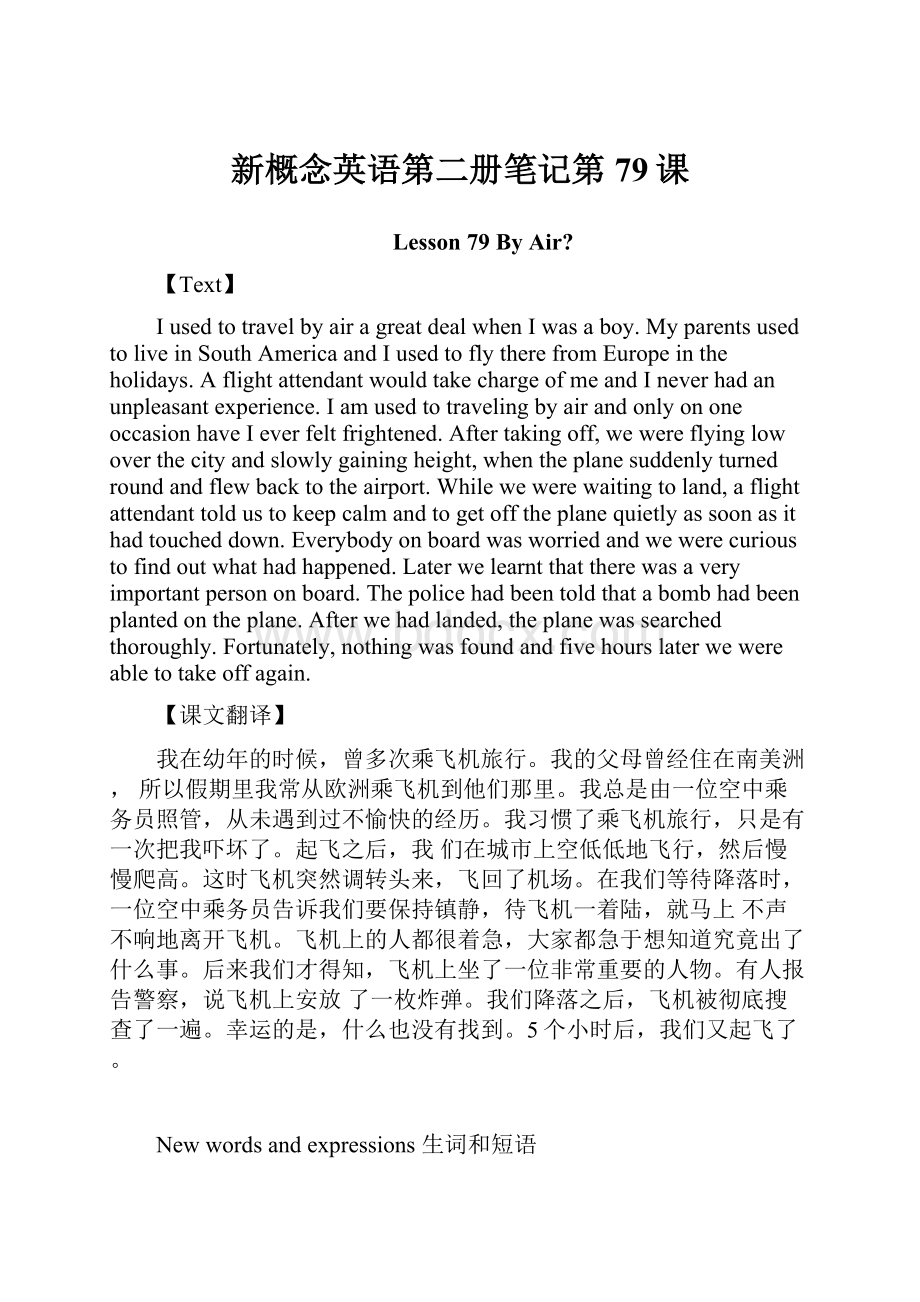新概念英语第二册笔记第79课.docx
《新概念英语第二册笔记第79课.docx》由会员分享,可在线阅读,更多相关《新概念英语第二册笔记第79课.docx(20页珍藏版)》请在冰豆网上搜索。

新概念英语第二册笔记第79课
Lesson79ByAir?
【Text】
IusedtotravelbyairagreatdealwhenIwasaboy.MyparentsusedtoliveinSouthAmericaandIusedtoflytherefromEuropeintheholidays.AflightattendantwouldtakechargeofmeandIneverhadanunpleasantexperience.IamusedtotravelingbyairandonlyononeoccasionhaveIeverfeltfrightened.Aftertakingoff,wewereflyinglowoverthecityandslowlygainingheight,whentheplanesuddenlyturnedroundandflewbacktotheairport.Whilewewerewaitingtoland,aflightattendanttoldustokeepcalmandtogetofftheplanequietlyassoonasithadtoucheddown.Everybodyonboardwasworriedandwewerecurioustofindoutwhathadhappened.Laterwelearntthattherewasaveryimportantpersononboard.Thepolicehadbeentoldthatabombhadbeenplantedontheplane.Afterwehadlanded,theplanewassearchedthoroughly.Fortunately,nothingwasfoundandfivehourslaterwewereabletotakeoffagain.
【课文翻译】
我在幼年的时候,曾多次乘飞机旅行。
我的父母曾经住在南美洲,所以假期里我常从欧洲乘飞机到他们那里。
我总是由一位空中乘务员照管,从未遇到过不愉快的经历。
我习惯了乘飞机旅行,只是有一次把我吓坏了。
起飞之后,我们在城市上空低低地飞行,然后慢慢爬高。
这时飞机突然调转头来,飞回了机场。
在我们等待降落时,一位空中乘务员告诉我们要保持镇静,待飞机一着陆,就马上不声不响地离开飞机。
飞机上的人都很着急,大家都急于想知道究竟出了什么事。
后来我们才得知,飞机上坐了一位非常重要的人物。
有人报告警察,说飞机上安放了一枚炸弹。
我们降落之后,飞机被彻底搜查了一遍。
幸运的是,什么也没有找到。
5个小时后,我们又起飞了。
Newwordsandexpressions生词和短语
【生词讲解】
1.parent
1)n父母(pl.)
eg:
JohnandMaryhavebecomeparents.
John和Mary已经为人父母了。
词汇拓展:
relationn家人
toinviteallyourrelationstodinner邀请你全家人来吃饭
relativen(正式)家人,亲戚(更常用)
egMyuncleismynearestrelative.我的叔叔是我最亲的亲人。
2)n(定)能繁殖的任何生物
theparenttree母树
parentcompany母公司
parentagen出身,身世
achildofunknownparentage身世不明的小孩
parenthood父母的身份或情况
2.flightattendant空中乘务员
air-hostess空姐
flight
1)班机,航班
eg:
Flightnumber447forGenevaisreadytoleave.
飞往日内瓦的447航班准备出发。
2)航程,飞行距离
astraightflighttowardshome直航回家
3)航空旅程
eg:
Didyouhaveagoodflight?
你搭乘飞机一路愉快吗?
attendant
n
(公共场所照顾游客的)服务员
aflightattendant
空中乘务员
amuseumattendant
博物馆接待员
shopassistant
售货员
3.frightenedadj受惊的,吃惊的
eg:
Thefrightenedhorseranawayfromthefire.
受惊的马从大火中逃跑了。
eg:
Hewasfrightenedatthethoughtofhiscomingexamination.
一想到即将到来的考试他就害怕。
eg:
Shewasfrightenedtolookdownfromthetopofthetallbuilding.
她害怕从高楼顶上向下看。
eg:
Thelittlegirlwasfrightenedthathermotherwouldn`tcomeback.
小女孩害怕妈妈不回来了。
区别
afraidadj害怕的
beafraidof害怕某物
beafraidofdogs害怕狗
beafraidthat(从句)害怕某事
beafraidtodosth害怕做某事
frighteningadj令人害怕的,令人吃惊的(主语是物)
afrighteningdram吓人的梦
frightfuladj可怕的,惊人的
afrightfulscene可怕的景象
frighten
1)v使吃惊,惊吓
eg:
Thelittlegirlwasfrightenedbythebigdog.
这个小女孩被大狗吓到了。
2)v吓走
eg:
Hefrightenedoffhisattackerbycallingforthepolice.
他叫警察吓走了袭击者。
frightn害怕
getafright吓一跳
4.curious
1)急于了解的,好奇的
eg:
Agoodstudentshouldalwaysbecurioustolearn.
好学生应该有求知欲。
eg:
Hewassocurioustoknowwhatwasintheletterthatheopenedit,
eventhoughitwasaddressedtohisfather.
他是如此的好奇想知道信里的内容以至于他打开了信,尽管信是写给父亲的。
2)好管闲事的
eg:
Myneighborsareverycurious.
我的邻居们非常爱管闲事。
curiosityn好奇,好奇心
outofcuriosity出于好奇
eg:
Theboyburnedwithacuriositytoknowwhatwasintheletteraddressedtohismother.
这个孩子极想知道写给妈妈的信里的内容。
5.bomb
1)n炸弹形近词:
comb梳子
plantabombinthepostoffice在邮局安放一枚炸弹
2)原子弹
eg:
Hasthatcountygotthebomb?
那个国家有原子弹吗?
习语:
golikeabomb(指交通工具)行进快速,疾驶
eg:
Mynewcargoeslikebomb.
我的新车行进非常快。
spendabomb/costabomb花了许多钱
bombern轰炸机
fightern战斗机
6.plant
1)v安放
eg:
Heplantedhimselfinachairbythefire.
他稳坐在炉火边的椅子上。
plantoneself(安放自己=稳坐)
eg:
Heplantedaknifeinherback.
他在他的背上插了一刀。
2)v种植
eg:
Aprilisthetimetoplant.
四月是种植的时间。
3)v播种,培植
eg:
Thehillsidewasplantedwithtrees.
山坡上被种满了树。
4)n植物
eg:
Allplantsneedwaterandlight.
所有的植物都需要水和阳光。
5)n工厂
eg:
They`vejustbuiltanewchemicalplant.
他们刚刚兴建一所化学厂。
【课文讲解】
1.IusedtotravelbyairagreatdealwhenIwasaboy.MyparentsusedtoliveinSouthAmericaandIusedtoflytherefromEuropeintheholidays.
①usedtodo
我们用usedtodo表示过去有过但现在已不存在的习惯,以便将过去与现在形成对照。
它后面经常用由butnow...,butnot...anymore/anylonger等构成的、用了一般现在时的句子以强调过去和现在的不同之处。
eg:
-Doyouwatchtelevision?
-Iusedto,butIdon'tanylonger.
-你看电视吗?
-我过去常看,但现在不看了。
eg:
Iusedtosmoke,butIdon'tanymore/anylonger.
我过去常吸烟,但现在已不吸了。
eg:
Heusedtobealazyboy,butnowheisveryhard-working.
他过去是个懒孩子,但现在他很勤奋。
在针对usedto提问时,一般也用did
eg:
-Iusedtobeagoodswimmer.
-Didyoureally?
Ididn'tevenknowyoucouldswim.
-Didyouusetosmoke?
-Yes,Idid/usedto.
-我过去是个游泳好手。
-真的吗?
我以前甚至不知道你会游泳。
-你从前吸烟吗?
-是的,我吸。
区别:
would是另一个用于描述过去经常性行为的词,它与usedto有时可以互换,有时则不可以,而且
would需要指出具体时间,usedto则不需要。
1)当usedto暗示与现在的对照时,不可用would替换:
eg:
Iusedtodrinkheavily,butIhavegivenupdrinkingnow.
我过去喝酒很厉害,但我已戒了。
eg;Ineverusedtoeatalargebreakfast,butIdonow.
我过去早饭吃得不多,可现在我吃得很多。
2)当usedto描写过去的状态时,也不可与would互换,would只表示过去特有的习惯或行为:
eg:
Iusedtobeawaiter,butnowI'mataxi-driver.
我过去是个侍者,但现在我是出租汽车司机。
eg:
Theyusedtoownacar.
他们过去有辆车。
3)当usedto不强调与现在的对比时,可与would互换。
但一个故事开头时不用would,必须首先用一般过去时或usedto描述背景,然后用would表示习惯性动作:
eg:
WhenIwasaboywealwaysspent/usedtospendourholidaysonafarm.
Wewouldgetupat5andwewouldhelpmilkthecows.
我小时候经常在农场度假。
我们总是5点起床,帮助挤牛奶。
Whatsortofthingsdidshelikedoingasagirl?
她小时候喜欢做些什么事?
Sheusedtowouldclimbtreeswhenevershecould.
她一有机会就爬树
区别:
beusedto表示“习惯于”,后面跟名词或动名词,be也可用get等代替:
eg:
I'musedtoshoppingalone.
我习惯于一个人购物。
eg:
I'musedtogettingupearly.
我习惯于早起。
eg:
IsoongotusedtogettingupearlywhenIstartedworkingasabaker.
我开始当面包师不久就习惯早起了。
②表示“许多”的英语短语:
(1)修饰可数名词复数形式的有many,agood/greatmany,quiteafew,alarge(或great)/smallnumberof等,其后的谓语动词用复数形式。
(2)修饰不可数名词的有much,agreatdealof,quitealittle,anamountof等。
其后的谓语动词用单数形
(3)既能修饰可数名词,又能修饰不可数名词的有alotof,lotsof,plentyof,agreatquantityof等,谓语动词根据主语是可数或不可数决定单复数形式。
anumberof+可数名词,谓语用复数,意为许多,大量的……
thenumberof+可数名词,谓语用单数,意为……的数目
2. AflightattendantwouldtakechargeofmeandIneverhadanunpleasantexperience.①takechargeof负责照料(某人、某物)
eg:
Canyoutakechargeofthisclassplease,MissJones?
Jones小姐,你能负责照料这个班吗?
insomeone`scharge/undersomeone`scharge受管理,由(某人)负责
eg:
Thishospitalisinherchargeuntilthedirectorcomesback.
在主管回来之前这家医院由她负责。
inchargeof负责
eg:
I`llbeinchargeofthewholefactorynextweekwhenthedirectorisaway.
下周厂长不在的时候整个厂由我负责。
bringachargeagainst控告(某人)
eg:
Thepolicebroughtachargeofmurderagainstme.
警方控告我谋杀。
②unpleasantadj不愉快的,讨厌的
unpleasantsmells恶心的气味
unpleasantweather讨厌的天气
afewunpleasantwords一些难听的话
anunpleasantexperience一次不愉快的经历
unpleasantnessn不愉快
eg:
Don`tlettherecentunpleasantnessendourfriendship.
不要让眼下这些不愉快终止我们的友谊。
un+adj构成相反含义的adj
unpractisedadj笨手笨脚的
unprincipledadj无原则的,无廉耻的
unprofessionaladj非本行的,非专业的
unmannerlyadj粗鲁的
unmarriedadj未婚的
unknownadj不知道的;不知名的
unfortunateadj不幸的
unforgettableadj难以忘怀的
3.IamusedtotravelingbyairandonlyononeoccasionhaveIeverfeltfrightened.
①beusedto+n/ving/代词习惯于(to为介词)
eg:
Iamnotusedtodrinking.
我不习惯喝酒。
amanusedtocountrylife习惯于乡村生活的一个男子
②onlyononeoccasion仅仅有一次
onlyononeoccasionhaveIeverfeltfrightened只是有一次吧我吓坏了。
注意语序,按理说,现在完成时是Ihaveeverfeltfrightened,本句话中only引导一个状语提前放在句首了,后面要求使用倒装结构,把have提前。
③倒装语序的问题only(seldom,hardly)+状语放在句首时,用倒装句。
eg:
Onlyinthiswaycanyouhopetoimprovethesituationthere.
只有用这种方式你才有希望改善那儿的状况。
Onlyinthisway在句中做状语,当only引导
的状语放在句首时,后面使用倒装结构。
Youcanhope,我们把can提前,hope放在后面,
称作“部分倒装”
eg:
Hardlyhadhefinishedwhensomeonerosetorefutehisviews.
他刚一讲完就有人站起来驳斥他的观点。
(hardly…when,刚一…就…,hardly是否定词,几乎不的含义)一旦hardly提前时,后面使用倒装语序。
eg:
Scarcelyhadshefallenasleepwhenaknockatthedoorawakenedher.
她刚一睡着,就被敲门声吵醒了。
(scarcely…when…,相当于hardly…when…,刚一…就…)scarcely放句首时,后面使用倒装语序。
eg:
NotuntilquiterecentlydidIhaveanyideawhataguidedmissilewaslike.
直到最近我才清楚导弹是什么样的。
(notuntil直到…才),not放句首时,后面使用倒装语序。
以never,little,often,等词引导的句子,也常用倒装语序。
eg:
Neverbeforehasourcountrybeenasunitedasitistoday.
今天我们的国家空前团结。
eg:
Manyatimehashegivenusgoodadvice.
他有很多次给我们好的建议。
eg:
Littledidwesuspectthatthedistrictwassorichinmineralresources.
我们一点也没有想到这个地区的矿产资源如此丰富。
eg:
Oftendidwewarmthemnottodoso.
我们经常警告他们不要这样做。
4.Aftertakingoff,wewereflyinglowoverthecityandslowlygainingheight,whentheplanesuddenlyturnedroundandflewbacktotheairport.
①takeoff起飞
flylowover在…上方低低地飞行
flybackto飞回
fly
1)v飞,飞行
eg:
"Howdidyougethere?
""Iflew."
“你怎么到这来来的”?
“我坐飞机来的”。
(Icamebyairport)
eg:
Abeeflewinthroughtheopenwindow.
一只蜜蜂从开着的窗子飞了进来。
2)v开飞机
eg:
Hewasthefirstmanevertoflythattypeofaircraft.
他是第一个驾驶那种飞机的人。
3)v搭乘飞机
eg:
IalwaysflyBritishAirways.
我经常搭乘英航的飞机。
习语
eg:
Imustfly.
我必须快点了。
(口)急忙离去
flyintoatemper勃然大怒
eg:
Thebirdhasflown.犯人逃跑了。
makethedustfly/makethefurfly/makethesparksfly引起争吵
②slowly/graduallyadj缓慢的,慢慢的,逐渐的
③gainv获得,增加
gainhight爬高
gainspeed加速
gainexperience获得经验
when/atthattime那时
turnaround调头(turnround)
turnaway拒伸援手
turnback
1)往回走
2)把(某页的角)折起来
eg:
Turnthepagebackanditwillmarkyourplace.
把某页折个角,做个记号。
turndown
1)减弱,降低
eg:
Turnthatrediodownatonce.立刻把收音机关小点。
2)拒绝
eg:
Sheturnedhimdown.
她拒绝了他。
turnin
1)归还
eg:
Youmustturninyouruniformwhenyouleavethaarmy.
当你离开部队时你必须归还制服。
2)上交,缴(美)
eg:
Thisisapoorpieceofworkyou`veturnedin.
你交的作品很糟糕。
5.Whilewewerewaitingtoland,afligh